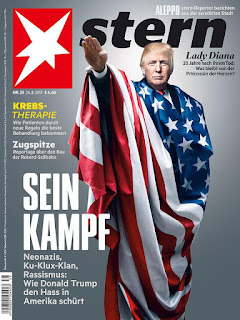It
could be argued that the reason only 58% of Americans voted in last year's election
was they were weary of all the politicking by the time the election rolled around. Our campaigns have become an industry, and much like the annoying retail creep of
Christmas, they keep moving further from the actual event.
 |
By contrast, turnout for Germany's last election was around 70% (which was lamented at the time for being rather low). But Germans aren't beating voters over the head and wearing them down with trivialities, like in the U.S.
This year's election in Germany is on September 24. Posters for local candidates only
started appearing around Munich a few weeks ago.
I followed a live feed on Twitter during the
debate between majority party candidates Angela Merkel and Martin Schulz, which seemed to be more of a casual discussion than the scorpion-sting sessions we witness in U.S. debates.
In fact, it’s
illegal to disparage another candidate in election ads in Germany, so
everything proceeds without the distraction of personal
attacks.
During
our election last year, I whined a bit about the booklet California sends to
voters. Pros, cons, and costs for each of the 20+ ballot measures, and local
candidate bios. It’s like studying for a test.
A
friend from Spain wished for something so detailed. With more than 20 political parties
participating in their elections, she said the choice usually came down to
which parties were not yet known to be corrupt.
Germany
may not have corruption to contend with, but it does have more than 40 parties
from which to choose, including a new hip-hop
party. Only a handful are considered the “main” parties that will decide
the face of the government.
Technically,
the U.S. also has more choices. Most ballots contain candidates
from at least five political parties, but with the majority of our history
dominated by just two, it’s easy to gloss over. And
while Germany’s legislature is made up of a mix of its parties, the U.S.
currently boasts only two senators whose affiliation is neither Democrat nor
Republican.
A
few weeks ago, CNN did a great breakdown of how the German political machine works. Although
the concept of achieving maximum representation is the same, I find it to be much less
confusing than our electoral college behemoth.
 |
| Image from TeamLiquid.net |
Like
the U.S., there are regional differences in voting here, and I think many of those tendencies align with the stereotypes Germans hold about each other: northerners
have a reserved demeanor but are liberal, southerners are insular and conservative, North Rhinelanders
are outgoing but maybe superficial, Saxons are proud of their
exploring/plundering heritage, etc.
Unlike the U.S., the autonomy of the 16 German states is broader--it's the legacy of a country comprising former fiefdoms and kingdoms.
Before
learning about the two-vote system, I asked a German friend if it was likely
someone like Trump could be voted into office here. He said Germany learned its lesson. People vote for parties and what they stand for; it’s not like the cult of personality
we’ve come to celebrate in American elections.
Trump
is the perfect example of this. He is by no means the best representative for the Republican platform, but he had a surprising avalanche of support that forced the Republicans to take a chance and bet on him as their best shot of taking control of the government.
 The only real surprise is that people are surprised Trump
is so unpredictable. As he tramples roughshod over the American democratic ideal, leaving even our allies shaken in his wake, Germans have had no qualms about showing their distaste
for him and what he stands for.
The only real surprise is that people are surprised Trump
is so unpredictable. As he tramples roughshod over the American democratic ideal, leaving even our allies shaken in his wake, Germans have had no qualms about showing their distaste
for him and what he stands for.
Yet despite their assertions of practical decision-making at
voting time, there is an obvious affection among many Germans for Angela Merkel. Her nickname, “Mutti,” is
a diminutive of Mother.
Merkel is the antithesis of Trump and other so-called populist leaders. Her measured approach seems to look five steps down the road to meet divergent interests rather than self-serving, short-term tactics.
The
biggest challenge to her leadership has been the issue of immigrants, which, at
its height, propelled Germany’s version of an alt-right party into unprecedented
popularity.
 But that seems to have died down, and the top two parties agree on
another social stickler: lowering taxes for the middle class and possibly eliminating
surcharges levied since reunification to rebuild the former East Germany.
But that seems to have died down, and the top two parties agree on
another social stickler: lowering taxes for the middle class and possibly eliminating
surcharges levied since reunification to rebuild the former East Germany.
Although
there’s a time to shake things up, and proceed with informed and thoughtful
change, the proponents of a new world order have not brought that to the table to date.
Divisiveness, posturing, and inflammatory rhetoric is not what we need in the
face of continued refugees of war and terrorism, newly nuclear-capable nations, and the increasing impacts of climate change.
Germany
is Europe’s strongest economy, with a record low unemployment rate. There are few
things to rail against, so in all likelihood voters will
choose to stick with stability.
These days, "tried and true" seems to be the new political revolution.


No comments:
Post a Comment